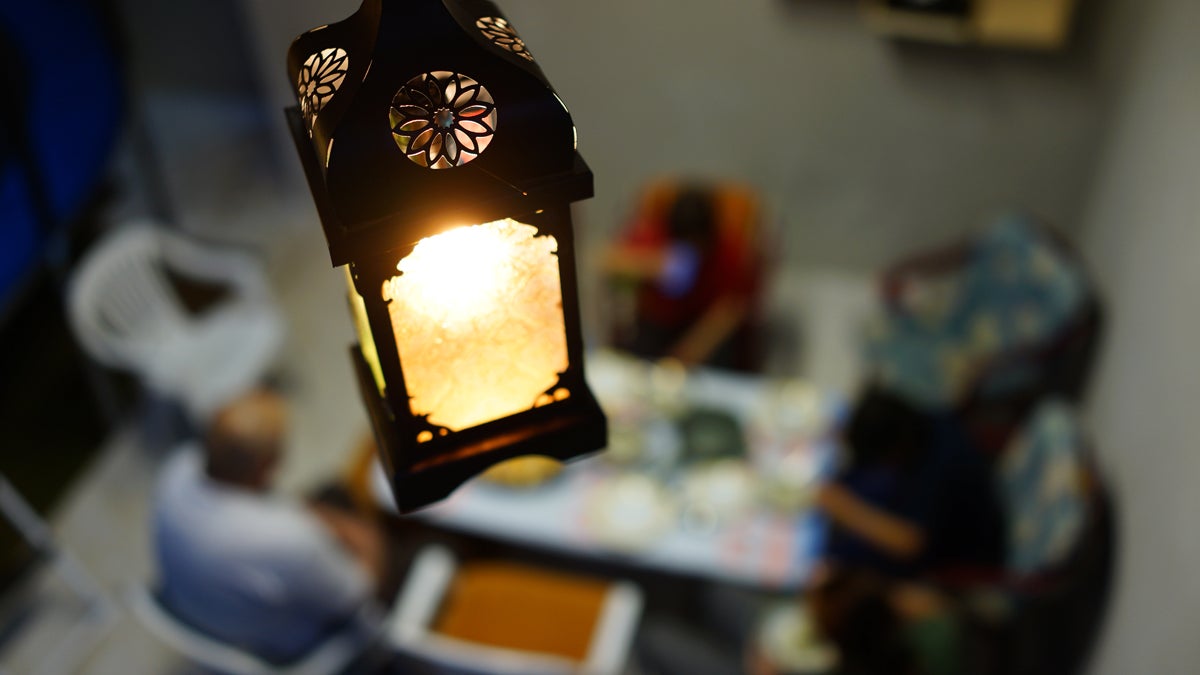How to resist Muslim misinformation at work during the Ramadan fast

(Ramadan lantern image courtesy of Shutterstock.com)
Most of us, on these hot, humid days of summer, find comfort in refreshing food and drink. Not so my Muslim sisters and brothers, fasting during Ramadan. How does this blessed practice mesh with the demands of a typical work day? I talk to Kameelah Rashad of the Muslim Wellness Foundation.
Most of us, on these hot, humid days of summer, find comfort in refreshing food and drink. We move from water bottle to juicer to iced coffee or tea, before landing on a cool drink at the end of the day — not to mention possibilities for ice cream and fresh salads on park benches and patios.
But these particular hot days, my Muslim sisters and brothers have to wait out the heat, fasting from food or drink even while surrounded by everyone else sipping and nibbling.
The holy month of Ramadan — which honors the first revelation of the Quran to Muhammad — is based on a lunar calendar, so the dates on which it falls slowly shift over the course of the year. Right now, we’re in the midst of Ramadan at a time of year when the days are the longest and hottest in the Northern Hemisphere, making it even an even more intensive experience for observant Muslims. (Appropriately, the word ‘Ramadan’ comes from an Arabic root meaning heat or dryness.)
The practice is one of the Five Pillars of Islam, the spiritual practices core to the religion, and the daytime fasting extends beyond food and drink to smoking, sexual relations, and behavior like criticism or speaking falsely, all toward a greater awareness of human limitations — and the humanity and needs that we all share. The fast is broken by a meal late at night; a pre-dawn meal precedes the day to come.
As we near the end of Ramadan, I was curious about the impact the fasting has had on work life. After all, most of us rightly rely on fluids and protein to get through the day and to maintain focus and productivity. So I asked Kameelah Mu’Min Rashad, founder and executive director of the Muslim Wellness Foundation, based in Philadelphia, about what she’d noticed this past month.
“Of course, in the summer it’s particularly difficult,” Rashad says. “There’s understanding that it’s not just a spiritual act but an impact on your physical health. The month ends around July 17 so we’re right in the middle of the longest days of summer. People are thinking about levels of concentration, fatigue during the day, being in different kinds of activities, and the impact fasting has on the activities.”
There are different tacks that Muslim employees can take to help keep up with work and still retain their spiritual focus. “They can have a conversation with their employer or supervisor to let them know it’s a religious practice,” Rashad says. “We’re fasting 16 or 17 hours a day, so it helps to just educate the employer on the reason for the fast so it doesn’t seem like it’s an option an employee can do ‘outside of work.'”
This education in the workplace can help supervisors and colleagues understand an employee’s slightly different behavior. “There are mood changes,” Rashad explains. “You can be cranky or tired, especially in the first week when your body is adjusting to such a shift.”
Sleep habits are impacted, too, which can also affect focus at work. “We break fast around 8:30 in the evening,” she says. “Iftar is the evening meal, and there are night prayers at the mosque. Someone could be up till midnight, then up again at 4 a.m. for pre-dawn breakfast.”
Understanding is key, but employers’ responses can vary widely, and some employees may not feel they can broach the subject. “Some employers may be more receptive,” she says. “Others, depending on the industry, may say, ‘Just show up and do your work.’ It may not be a relationship where someone can explain their religious obligation — especially someone in an hourly job or working outside or in the food industry. There’s so much blessing in even trying to adhere to religious obligation under those circumstances.”
And apart from the interests of an employer, the climate in American culture these days can be tricky for someone of the Muslim faith to maneuver. The news media stereotypes Islam and often ignores the daily realities of most American Muslims. “Especially now, despite more information that’s out there,” Rashad says, “there’s so much misunderstanding about Muslims. With work, new converts may feel hesitant about explaining a religious obligation or asking for understanding of how it impacts their work performance.
“It’s conceivable an employer could say ‘You’re in America. Just do your work.’ Unfortunately, I’d hope no one would be that insensitive. But they’re all possibilities. Most people aren’t asking for special concessions, just awareness.”
Which sounded entirely reasonable to me: Most major faith traditions have spiritual practices that can affect work life, everything from food guidelines to the holy days people need to observe at home or in their faith community. But again, misperceptions of Islam and American Muslims in particular can enter in.
“The trend I see is that adherence to Islam and practice is that it should be optional and is incompatible with American-ness,” Rashad says. “Sort of, ‘Why should I extend understanding to something I’m not sympathetic to?'”
But if employers and colleagues are up for a bit of listening, they end up getting a taste of the spiritual reward, no pun intended.
“The beauty of being able to communicate about the challenges and benefits of the fast is that people can share a better sense of clarity and awareness of their own needs and the things that have troubled them,” Rashad says.
And she has experienced that more-positive, empathetic kind of response that allowed her colleagues to deepen their own feeling of connection and exploration. “When I worked in a cubicle office setting, I had several co-workers say, ‘I want to see what this is like,” she says.
Moments oriented around food and drink become part of a typical work day — coffee, meeting for lunch, breakfast items at a meeting, after-hour gatherings, Rashad says: “I found touching that others would say ‘I’m sorry’ if they asked if I wanted coffee. People can genuinely be apologetic if they forget you’re fasting. On a personal level, I’ve seen co-workers sharing this, wanting to participate as a show of solidarity. Those are the instances that make me feel optimistic. There are still a lot of people who are curious and just want to know.”
Talking about fasting with her coworkers gave them all a chance to see the connections with practices of fasting in other faith traditions, such as Judaism and Christianity. “We’d use that as a way of explaining it. And then someone says ‘Oh ok, I’ll try your way,'” Rashad says. “That stands out, when people challenge themselves to walk a day in your fasting shoes. They have a new appreciation of what it is to sustain production and be engaged when you’re exhausted.”
And in the end, the month-long experience, like so many spiritual practices, is meant to move believers toward greater awareness and gratitude. “There are so many people who involuntarily don’t have access to food and water,” Rashad explains. “So this practice teaches us to bear in mind the things we take for granted. I appreciate that about the fast — if someone can’t fast [as for medical reasons], they’re taught to feed someone who’s hungry as a way to observe the fast. There are so many things we take for granted, so withholding food and drink reminds us that, even in America, there are people who go hungry every single day. So it helps me thank God at the end of the day, to have water, to have people who love me. It clarifies the simple things. It’s a spiritual and communal way of acknowledging the mercy of God and the things we have that are truly blessings.”
As we signed off, I asked about getting together for more cool convo over a cup of coffee. “Of course,” she said, laughing, “but only after July 17!”
WHYY is your source for fact-based, in-depth journalism and information. As a nonprofit organization, we rely on financial support from readers like you. Please give today.




